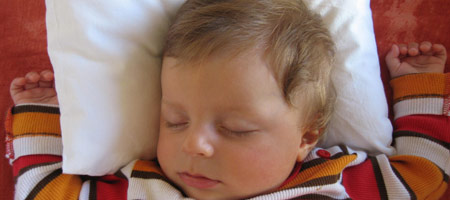Nap Time and Sleep
Getting baby to nod off can be frustrating, especially when all you can think about is sleep.

It’s no secret how important sleep is to us (as adults). For an infant/child it’s equally, if not more, important.
If you have any experience at all with children, you’ll know that after a good nap/night sleep they are less likely to be cranky and are far happier. As a result, a parent will be happier too. But there are more fundamental reasons too:
Development in all areas – emotional, physical, intellectual. Good strong brain development occurs during sleep. It’s a time where they can dream and process all the things that have gone on during the day.
It’s said that the better they sleep, the better they sleep!!! This has long term effects on the child. Setting a good sleep pattern as an infant can decrease chances of poor general health and emotional issues as they grow up.
If you have no set routine, an infant can become anxious
Getting into a routine shows a child boundaries which they genuinely love. If a child knows what’s coming next, they will be feel safe and secure and even feel like they are in control of a situation. If you have no set routine and the bedtime is a bit of a moveable feast, an infant can become anxious, leading to sleep problems. Popping them into the cot and hearing your words “Night Night it’s sleeptime”, gives them a strong bedtime and naptime association and so they become less likely to have any problems when you want them to sleep.
Also it’s highly important for mum and dad to have their own time, be that in the daytime or evenings.
As your baby gets bigger, he or she will want to stay awake for longer periods during the day. Instead of perhaps three naps a day (including one long one), they may start to change this and stretch their mornings out to fill in more playtime.
From six months, parents are advised to have a 40 minute nap in the morning, a 40 minute nap in the afternoon and a two hour nap at lunchtime - although we know this may be wishful thinking for many!
It’s highly important for mum and dad to have their own time
From nine months, baby is probably beginning to terrorise the floor boards and they may be less willing to nap successfully in the mornings. Try and stretch them out till lunchtime. You may find that initially they just can’t make it and some even fall asleep in their lunch! Allow them a 15 minute catnap before 10am. Wake them and have a snack and a drink of water. They should be able to manage to make it to midday for a good nap.
Later in the afternoon, they may or may not sleep again. This normally depends on how well they sleep at lunchtime. If they do catch a nap later, don’t let them sleep for too long and try and have them awake again by 5pm, giving you a nice couple of hours before bedtime.
Suggested Daily Routine for Baby at 9 Months
- 7.00/7.30 Wake and feed
- 8.30 Breakfast
(maybe a short nap around 9.40 but wake at 10) - 10.30 Snack and Water
- 11.45 Dinner/Lunch (this is main meal of day – what we would describe as dinner)
- 12./12.15 Sleep (Up to 2 hours).
- 2.30/3.00 Feed (7oz)
- 4.00 Snack and water
(May have a nap at around 4.30 but awake by 5) - 5.30 Tea (lighter meal than lunchtime)
- 7.30 Feed (7oz)and bed
Don’t forget to check out Everymum’s Baby & Toddler sections for more information and useful tips.
Fiona O'Farrell is a Paediatric Occupational Therapist Specialising in Baby Sleep and Baby Development.
Fiona is Ireland's only baby focused approach specialist to sleep. Fiona can identify the real reason why your baby is not sleeping and in doing so ensures long term Healthy Sleep Patterns. Her approach ensures no additional stress on your baby or young child which has a very positive impact on your baby's development long term. Fiona provides workshops to help parents prevent sleep problems from arising. These workshops are a must for expectant and new parents.
Fiona is validated by the Department of Health and registered member of AOTI. This ensures accurate and trusted sharing of knowledge. Fiona is also mum to three small children and understands the difficulties faced by parents. Visit everymum.ie/experts for more information.